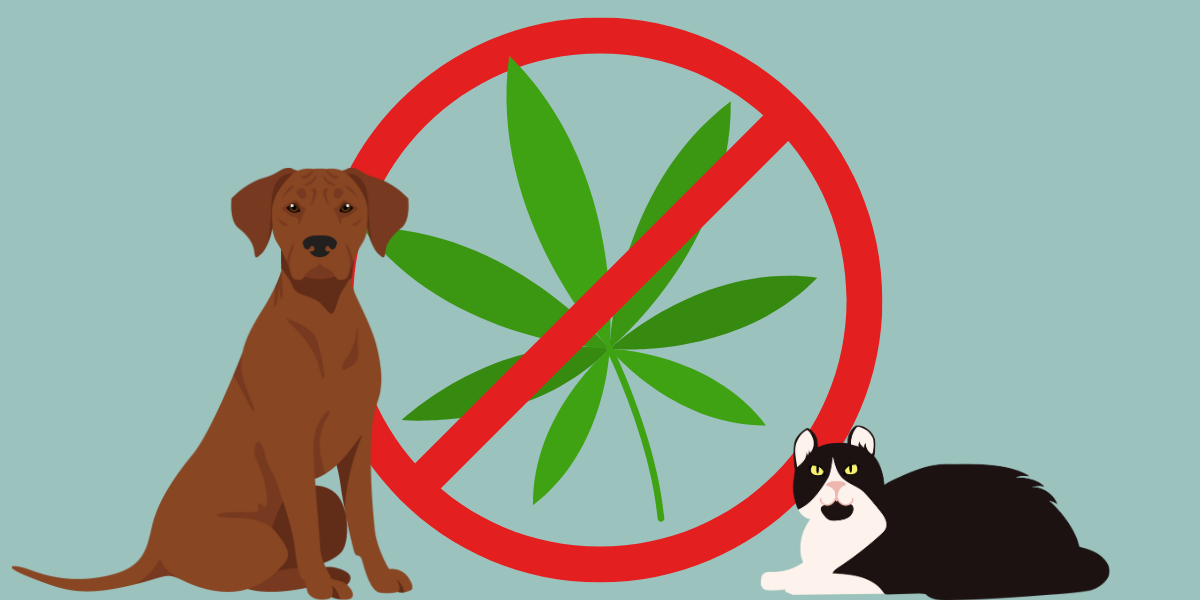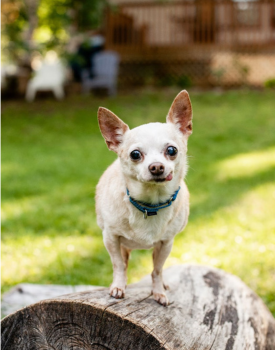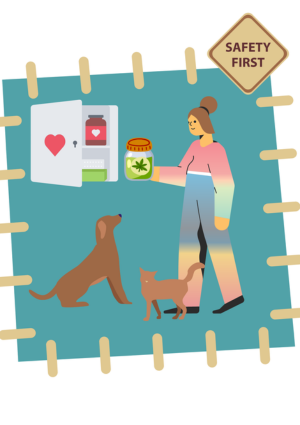On high alert
With recreational marijuana now legal in Minnesota, CVM expert explains impact on pet health and steps to take if you suspect your pet has ingested cannabis

With recreational marijuana now legal in Minnesota, CVM expert explains impact on pet health and steps to take if you suspect your pet has ingested cannabis
Marijuana is toxic to pets, and medical advice should be sought if it is ingested.
RubyRoo, a sweet 18-month-old Chihuahua puppy living in Pine Country, Minn., snuck into the kitchen when no one was watching. There, she stealthily ate some of her owner’s concentrated marijuana-infused butter intended for cooking.
Within two hours, RubyRoo was drooling heavily, extremely lethargic, and hypersensitive to sound and touch. Her owner called the Pet Poison Helpline (PPH), a nationally recognized 24-hour animal poison control service, for advice. Due to the severity of her condition, it was no longer safe to induce vomiting at home, and PPH advised RubyRoo’s owners to seek emergency veterinary care for the dog.
PPH worked together with her veterinarian to develop a tailored treatment plan. RubyRoo was hospitalized overnight on IV fluids and medications to normalize her heart rate. By the next day, she had recovered and could go home.

It’s an incident that emphasizes the importance of keeping marijuana and other drugs safely away from pets, according to Dr. Ahna Brutlag, senior director of veterinary services and senior veterinary toxicologist for PPH and an adjunct assistant professor at the University of Minnesota’s College of Veterinary Medicine (CVM). The helpline is a collaborator with CVM and fields thousands of calls a year from owners who suspect their pet consumed something poisonous.
“Pet Poison Helpline typically fields over 400 calls per month from owners concerned that their pet has gotten into marijuana,” Brutlag says.
As more states have legalized marijuana use in the United States, the number of pets accidentally ingesting it has climbed as well. In the past six years, PPH has seen a 450-percent uptick in marijuana cases. Marijuana ranked sixth on its list of the top 10 most common poisons in 2022.
On May 30, 2023, Minnesota became the 23rd state to legalize recreational marijuana. Beginning Aug.1, Minnesotans age 21 and up can grow, possess, and purchase marijuana as outlined in the law. Understanding the nuances of this legislation and its public health implications will require some time. However, based on the experiences of other states that legalized marijuana as early as 2012, it’s known that pet owners should take certain precautions to ensure the safety of their pets.
With the legalization of marijuana, the interest in cannabis cultivation has created plants with higher levels of tetrahydrocannabinol (THC). THC is the psychoactive component of marijuana that affects the neurotransmitters or receptors in the brain and leads to the sensation of feeling high. Other cannabis products, such as edibles, oils, and resins, contain levels of THC that are dangerously high for dogs and cats. Even minimal amounts of products with THC, including delta-8 THC, can be toxic to cats and dogs because they have more cannabinoid receptors in their brains, resulting in a stronger reaction to the substance.
The most common reason for THC poisoning is ingesting other cannabis-containing products, such as gummies, candy bars, or baked goods containing the compound. Overcome by temptation, a dog consumes a pan of brownies containing the substance and then faces two toxins—chocolate and THC.
Another source of THC for pets is ingesting discarded joints or vaping liquids and pens. Occasionally, exposure to second-hand smoke or unauthorized administration of medicinal marijuana by the pet’s owner causes pets to react.
If owners suspect their pet has ingested marijuana, they should immediately call PPH or a veterinarian. While the consumption of marijuana by a pet is seldom fatal, PPH or a veterinarian can help determine if at-home or in-clinic care is needed. In some instances, inducing vomiting in a dog right after ingestion may prevent poisoning. In other cases, inducing vomiting may harm the pet, and other treatments will be more helpful.

Pets that have consumed marijuana may show signs including:
Less common signs include:
Signs will likely occur about 30 minutes after consumption of the marijuana. Though relatively uncommon, one of the biggest dangers to a pet who has ingested marijuana is choking by vomiting when over-sedated.
Brutlag can recount many stories about nervous owners calling PPH in fear that their pet found and ingested a stash of marijuana. With the recent legalization of marijuana in Minnesota, she expects the PPH to see an increase in these calls.
“With legalization, owners who may otherwise have hesitated to call for medical advice out of fear to disclose possession of marijuana are now more willing to call in for guidance,” she says.
Brutlag advises pet owners who have marijuana or cannabis-containing products in the house to take precautions to ensure the safety of their pets. She suggests keeping the products in a secure cabinet away from pets. Edibles or other CBD products must also be kept out of reach from curious pets with a good sense of smell. Additionally, owners should spare pets from exposure to secondhand smoke.
If a pet consumes or is exposed to a toxin or if its owner is unsure if the pet ate something toxic but notices the signs described above, call the Pet Poison Helpline at (855) 764-7661 or go to its website for information on potential poisons. Callers incur an $85 incident fee.